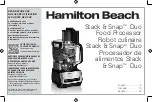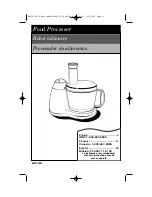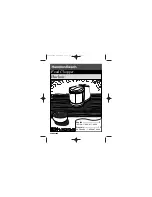
12
the food processor running.
• To minimise slender foods, such as carrots or celery, from falling
over in the feed chute, cut food into several pieces and pack the
feed chute with the food.
• Apply light pressure on the pusher for soft foods (berries and
tomatoes) and slightly more pressure for hard foods (onions and
potatoes).
• Do not process foods that are too frozen or hard. Make sure that
the tip of a knife can be inserted into the food before processing.
• If hard food, such as a piece of carrot, becomes wedged or stuck on the blade, stop the
food processor and unplug, then remove the blade. Gently remove the food from the
blade.
• When chopping sticky dried fruits, place the fruits in the freezer for about 10 minutes and
add a little flour or sugar to keep the pieces from sticking together.
• When preparing cake or cookie batter, use the S blade to cream fat and sugar first and
add dry ingredients last. Place nuts and fruit on top of the flour mixture to prevent over
chopping. Process nuts and fruits using short pulses to blend with other ingredients.
• When using the discs, do not let the food accumulate too high (over 2/3 full); stop and
empty the workbowl.
• Do not use the food processor to:
- Grind coffee beans, bones, grains or hard spices
- Liquefy fruits and vegetables
- Slice or chop warm meat
CARE AND MAINTENANCE
This product contains no user serviceable parts. Refer service to a qualified service
professional.
IMPORTANT:
Always unplug your processor from the outlet before cleaning.
IMPORTANT:
Blades are sharp. Handle blades and discs carefully.
• Completely disassemble processor parts before washing.
• Rinse parts immediately after processing for easier cleaning.
• Wipe base and feet with a damp cloth and dry thoroughly.
Stubborn spots can be removed by rubbing with a damp cloth
and a mild, nonabrasive cleaner. Do not immerse base in liquid.
• All removable parts can be washed by hand. The removable
parts can be washed in the dishwasher, top rack only (P). Hand-
washing of plastic parts will help to maintain the food processor’s appearance.
• For further instructions on how to disassemble the centre post for cleaning, see ‘INSERT
AND REMOVE THE CENTRE POST’ on page 6.
• Some staining of parts may occur. If so, make a paste of 2 tablespoons of baking soda and
1 tablespoon of water. Apply to stains and let stand overnight. Rinse and dry.
• Do not use rough scouring pads or cleansers on any plastic or metal parts.
•
Do not allow blades or discs to soak in water for long periods of time.
11
• Apply light pressure on the pusher for soft foods (berries and tomatoes) and slightly
more pressure for hard foods (onions and potatoes).
• Do not process foods that are so frozen or hard that the tip of a knife cannot be inserted into
the food.
• If a piece of hard food, such as a carrot, becomes wedged or stuck on the blade, stop
the processor and unplug, then remove the blade. Gently remove food from the blade.
• When chopping sticky dried fruits, place the fruits in the freezer for about 10 minutes and add
a little flour or sugar to keep the pieces from sticking together.
• When preparing cake or cookie batter, use the S blade to cream fat and sugar first and
add dry ingredients last. Place nuts and fruit on top of flour mixture to prevent over
chopping. Process nuts and fruits using short pulses to blend with other ingredients.
• When using the slicing/shredding disc, do not let the food accumulate too high
(over
2
/
3
full); stop and empty the workbowl.
• Do not use the processor to:
- Grind coffee beans, bones, grains or hard spices
- Liquefy fruits and vegetables
- Slice or chop warm meat
CARE AND CLEANING
This product contains no user serviceable parts. Refer service to a qualified service professional.
Important:
Always unplug your processor from the outlet before cleaning.
CLEANING
Important:
Blades are sharp. Handle blades and discs carefully.
• Completely disassemble processor parts before washing.
• Rinse parts immediately after processing for easier cleaning.
• Wipe base and feet with a damp cloth and dry thoroughly.
Stubborn spots can be removed by rubbing with a damp
cloth and a mild, nonabrasive cleaner. Do not immerse
base in liquid.
• All removable parts can be washed by hand. The removable
parts can be washed in the dishwasher, top rack only (P).
Hand-washing of plastic parts will help to maintain the food processor’s appearance.
• Some staining of parts may occur. If so, make a paste of 2 tablespoons of baking soda
and 1 tablespoon of water. Apply to stains and let stand overnight. Rinse and dry.
• Do not use rough scouring pads or cleansers on any plastic or metal parts.
• Do not allow blades or discs to soak in water for long periods of time.
• Remember to clean the internal shafts of the chopping blades. Use a brush to remove
any residual food particles.
• If you are having trouble closing the lid over the large workbowl, apply a small amount
of vegetable oil to the rim of the lid and workbowl. This should make the pieces work
more smoothly.
P
Summary of Contents for RHFP5000
Page 17: ...17 NOTES...
Page 18: ...18 NOTES...
Page 19: ...19 NOTES...
Page 20: ...20 NOTES...
Page 21: ...CLASSIC FOOD PROCESSOR RHFP5000 INSTRUCTIONS WARRANTY RECIPE BOOK...













































